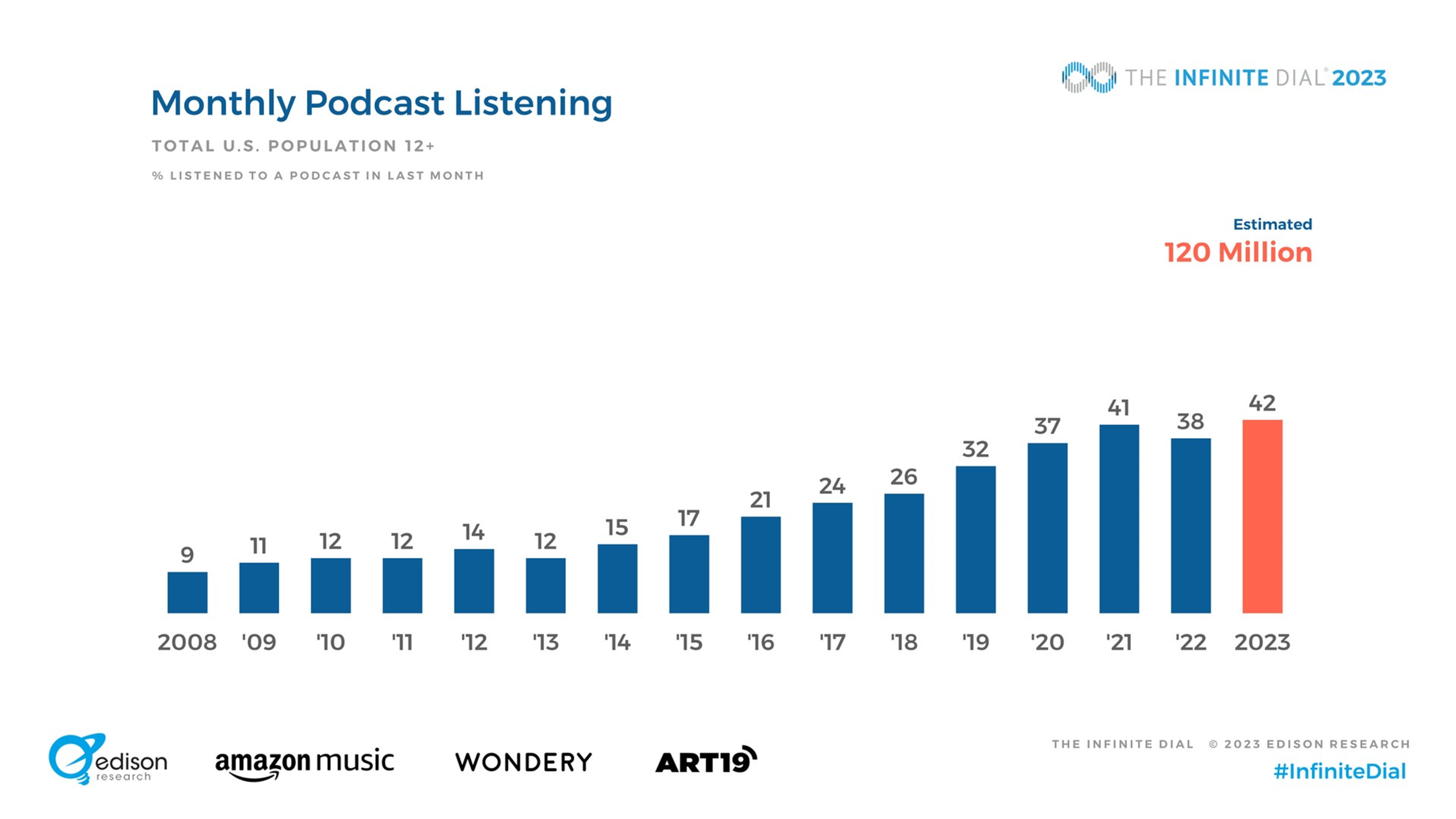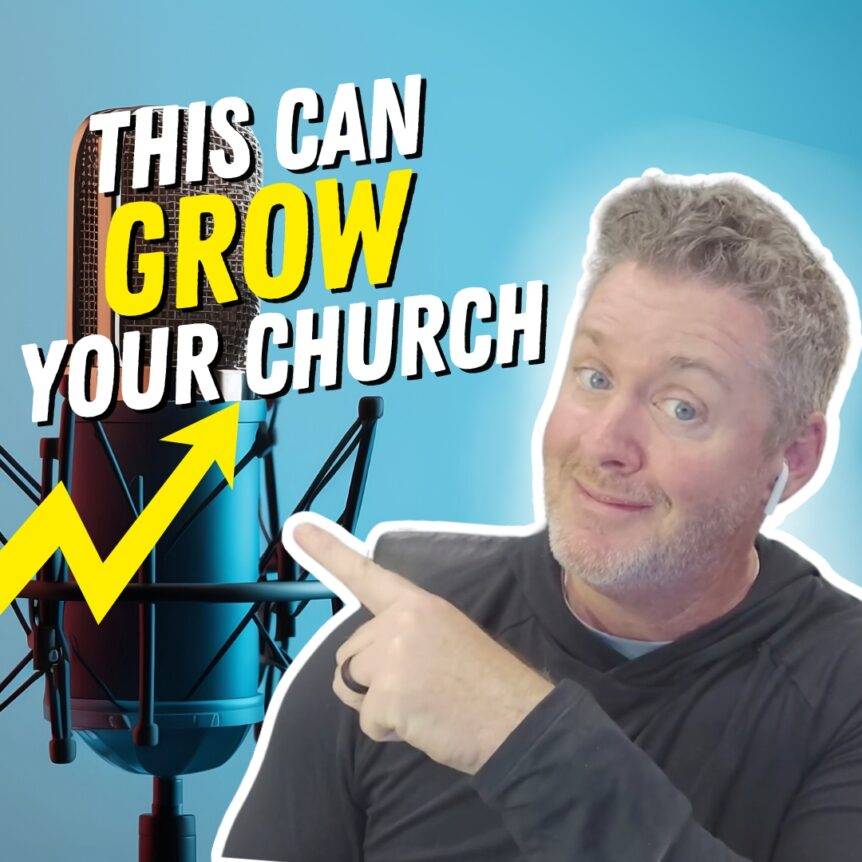In today’s digital age, connecting with our church community goes beyond traditional methods. There’s livestreaming, social media, and now a new popular form of media: podcasts. Church podcasting offers a powerful new way for your church to connect with your audience.
Through simple audio episodes shared online (just like this one!), churches can extend their message, teachings, and sense of community far beyond the physical walls of the church building. It’s an opportunity to bring sermons, discussions, and reflections directly into people’s homes, cars, and daily lives.
This guide aims to simplify the process of starting a church podcast, offering practical steps, insights, and strategies for expanding reach and fostering meaningful connections. Whether you’re tech-savvy or just starting out, the potential impact of church podcasting is vast, offering a platform for spreading messages of faith, hope, and community in an increasingly interconnected world.
Let’s jump in.
Estimated reading time: 11 minutes
Table of contents
What is a Church Podcast?

Church podcasting involves sharing audio recordings of religious content, discussions, and sermons online for people to listen to at their convenience.
By embracing podcasting, your church can adapt to the changing landscape of communication, meeting people where they are. Whether they’re commuting, exercising, or relaxing at home, they can be listening to a podcast.
Sermon Podcast Episodes
One common type of church podcast is the sermon podcast. This involves recording sermons delivered during church services and making them available for download or streaming.
Sermon podcasts allow people who may not be able to attend in person to still benefit from the teachings and messages shared by the church community. Sermon podcasts have been around in various forms for many years, and they’ve proven to be invaluable assets for people who are busy but want to grow deeper in their relationship with God.
Other Podcast Episodes
Sermons don’t have to be the only episodes you release as podcasts. You can podcast about anything related to church and church culture! There are Christian podcasts diving deep into books of the Bible, discussing controversial questions, or answering fan questions using a Biblical foundation.
Really anything you can talk about, you can record as a church podcast episode. We at Reachright aren’t a church, but we do a podcast every week to help churches with all kinds of ministry-related stuff. Maybe you can do something similar!
Expanded Reach with Podcasts
Church podcasting opens up new opportunities for engagement, outreach, and community building, allowing churches to connect with individuals who may not have otherwise been able to participate in their services or events. It’s a modern way to share timeless teachings and foster spiritual growth in an increasingly digital world.
According to Edison Research, podcast listening has skyrocketed in the past few years. In 2023, 42% of Americans listen to podcasts each month.

That’s a crazy amount of people! There is no doubt that a podcast is a great way to connect with people these days. So why not jump in on the fun?
Let’s dive into how you can get started podcasting.
Getting Started

Getting started with podcasting for your church is an exciting journey that can help you connect with your congregation and beyond. Here are some key steps to kick-start your church podcast:
Finding a Podcast Hosting Service
To make a church podcast accessible to a wider audience, it needs to be hosted on a podcast hosting service. These services store the audio files and provide a platform for distributing them to various podcast directories and apps, such as Apple Podcasts, Spotify, and Google Podcasts.
Podcast hosting services also offer features like analytics to track listener engagement and the ability to schedule and publish episodes.
Specifically, sermon podcast hosting platforms cater to the needs of churches and religious organizations. They often provide tools for organizing and categorizing sermons, creating podcast artwork, and customizing podcast feeds. Sermon podcast hosting platforms make it easier for churches to manage their podcast content and make it accessible to listeners across different devices and platforms.
Some popular and affordable podcast hosting services are Podbean, Acast, and Spotify for Podcasters.
Plan Your Content and Format
Decide on the type of content you want to share on your podcast. Like we mentioned in the section above, it could include sermons, Bible studies, interviews with church members, or discussions on relevant topics. Consider the format of your episodes—will they be solo recordings, interviews, or group discussions? Will there be one set host with different weekly guests, the same group of people each week, or something else?
Collaborate with your church members to brainstorm ideas and create a content calendar to stay organized. Remember to keep your episodes engaging, informative, and relevant to your audience’s interests and needs.
Integrate with Your Church Website
Once you’ve recorded and uploaded your episodes to your podcast hosting platform, integrate your podcast with your church website. Create a dedicated page or section where visitors can listen to episodes, subscribe to your podcast, and access additional resources.
Encourage your church members to subscribe, share, and leave reviews to help promote your podcast and expand its reach. Build community by inviting members to contribute ideas, share their stories, and participate in podcast episodes.
By following these steps and harnessing the power of podcasting, your church can create meaningful connections, share inspiring messages, and reach a wider audience with the love and teachings of your faith.
Building Your Podcasting Workflow

Building an efficient podcasting workflow is essential for creating and delivering high-quality episodes to your audience. Here are some tips on how to streamline your podcasting process.
Recording and Editing Episodes
Start by recording your podcast episodes using recording equipment such as microphones and audio interfaces. Choose a quiet and controlled environment to ensure good audio quality. If your church already has a tech/audio team (which you probably do if you have worship services), feel free to use their equipment and help.
Once recorded, edit your episodes to remove any mistakes, add music or sound effects, and improve overall clarity. Editing software like Audacity or Adobe Audition can help you refine your audio files and make them ready for publishing.
Uploading Your Podcast
After editing, upload your finished episodes to your chosen podcast host, as we described in a section earlier on. Make sure you have an account on your preferred podcast hosting service and follow their instructions to upload your episodes.
Once uploaded, your host will generate an RSS feed—a special file that contains information about your podcast and its episodes. This RSS feed is what podcast platforms use to display and distribute your episodes to listeners.
Promoting and Engaging with Your Audience
Once your episodes are live on podcast platforms like Apple Podcasts, Spotify, and Google Podcasts, it’s time to promote your podcast and engage with your audience. Share your episodes on social media, your church website, and through email newsletters to reach potential listeners.
Encourage your existing audience to subscribe, rate, and review your podcast to boost its visibility and credibility. Stay connected with your podcast listeners by responding to feedback, addressing questions, and incorporating listener suggestions into future episodes.
By establishing a clear and organized workflow, you can consistently deliver compelling podcast content to your audience and cultivate a loyal following for your church’s podcast.
6 Content Creation Strategies

Creating compelling podcast content is essential for engaging your audience and building a loyal following. Here are 6 simple yet effective strategies to help you craft engaging podcast episodes:
1. Discuss Relevant Topics and Themes
Before recording your podcast episodes, take the time to identify topics and themes that are relevant and meaningful to your audience. Consider the interests, concerns, and questions of your listeners, as well as the overarching mission and values of your church.
You can draw inspiration from current events, Bible passages, community issues, or personal experiences. By focusing on topics that resonate with your audience, you can capture their attention and keep them coming back for more. Don’t forget to include catchy episode titles that will get people excited to listen!
2. Diversify Your Content Formats
Keep your podcast content fresh and engaging by diversifying your content formats. Instead of solely delivering sermons or monologues, consider incorporating a variety of formats such as interviews, panel discussions, storytelling, and Q&A sessions.
Invite guest speakers, church members, and community leaders to share their insights and perspectives on different topics. Mixing up your content formats not only adds variety to your podcast but also caters to different learning styles and preferences among your audience.
3. Plan Engaging Episode Structures
Structure your podcast episodes in a way that keeps listeners engaged from start to finish. Begin with a captivating introduction that sets the tone and context for the episode. Clearly outline the main points or themes you’ll be discussing and maintain a logical flow throughout the episode.
Break up longer segments with transitions, anecdotes, or soundbites to maintain momentum and prevent listener fatigue. Consider ending each episode with a compelling call-to-action or reflection to encourage listener engagement and feedback.
This also includes keeping an eye on your episode length. If your podcasting hosting platform shows data that people are dropping off at a certain point in your episodes, it might mean they’re too long. Consider adapting to the analytics and adjust your episode lengths accordingly.
4. Tell Compelling Stories and Anecdotes

Stories have a powerful way of capturing the imagination and resonating with listeners on a personal level. Incorporate real-life stories, testimonials, and anecdotes into your podcast episodes to illustrate key points and evoke emotions.
Share personal experiences, testimonies of faith, and stories of transformation within your church community. By weaving compelling narratives into your podcast content, you can create a deeper connection with your audience and inspire them to reflect on their own lives and faith journeys.
5. Address Listener Questions and Feedback
People love to feel like they are a part of something. Create a sense of community and interactivity by addressing listener questions and feedback in your podcast episodes. Encourage listeners to submit their questions, comments, and prayer requests through email, social media, or voicemail.
Dedicate segments or entire episodes to answering listener questions, addressing common concerns, and providing practical guidance and support. When you actively engage with your audience and address their needs, you demonstrate that their voices are heard and valued.
6. Maintain Consistency and Authenticity
Consistency is key to building a loyal audience for your podcast. Establish a regular publishing schedule and stick to it to keep your listeners engaged and coming back for more. Whether you release new episodes weekly, bi-weekly, or monthly, maintain a consistent cadence that aligns with the expectations of your audience.
Additionally, stay true to your church’s values, beliefs, and personality throughout your podcast content. Be authentic, genuine, and transparent in your communication, and strive to build trust and credibility with your audience over time.
By implementing these content creation strategies, you can create podcast episodes that inspire, educate, and uplift your audience while strengthening the community within your church.
Guide to Church Podcasting

Creating engaging podcast content for your church is about connecting with your audience in meaningful ways. By identifying relevant topics, diversifying content formats, and maintaining authenticity, you can build a loyal following among your listeners.
Remember to listen to your audience, address their questions and feedback, and consistently deliver content that resonates with their interests and values. With dedication and creativity, your church podcast has the potential to really impact people. And isn’t that what it’s all about?
We wish you luck in your podcasting and God bless!
Further Resources on Church Podcasts





